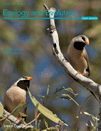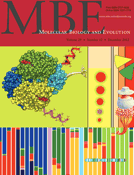
Evolution Letters
Scope & Guideline
Exploring the intricate dance of ecology and evolution.
Introduction
Aims and Scopes
- Evolutionary Mechanisms and Dynamics:
Research that explores the fundamental mechanisms driving evolution, including natural selection, genetic drift, and gene flow, as well as the dynamics of these processes in various ecological contexts. - Adaptation and Phenotypic Plasticity:
Studies focusing on how organisms adapt to their environments, including the role of phenotypic plasticity and epigenetic factors in facilitating adaptive responses to environmental changes. - Genomic and Molecular Evolution:
Investigations into the genomic underpinnings of evolution, including studies on gene expression, genomic variation, and the evolution of complex traits through molecular mechanisms. - Ecological and Environmental Influences on Evolution:
Research examining how ecological interactions, environmental gradients, and anthropogenic changes shape evolutionary processes and influence species diversity and adaptation. - Speciation and Hybridization:
Studies that delve into the processes of speciation, including the role of hybridization and the genetic and ecological factors that contribute to reproductive isolation.
Trending and Emerging
- Climate Change and Evolutionary Responses:
An increasing number of studies focus on how climate change impacts evolutionary processes, with research exploring adaptive responses and the potential for evolutionary rescue in changing environments. - Microbiome and Host Interactions:
Research examining the role of microbiomes in shaping host evolution and adaptation has gained momentum, highlighting the intricate relationships between organisms and their microbial communities. - Experimental Evolution and Adaptation:
There is a growing trend towards experimental evolution studies that investigate real-time evolutionary processes in controlled settings, providing insights into mechanisms of adaptation and evolutionary dynamics. - Genomic Insights into Speciation and Hybridization:
An emerging focus on genomic studies that elucidate the genetic basis of speciation and hybridization events reflects a trend towards integrating molecular data with traditional ecological and evolutionary theories. - Epigenetics and Evolution:
The exploration of epigenetic mechanisms and their role in evolutionary processes is gaining traction, emphasizing how environmental factors can influence genetic expression and contribute to adaptive evolution.
Declining or Waning
- Traditional Population Genetics:
Research that primarily focuses on classical population genetics has decreased as newer methodologies, such as genomic approaches and high-throughput sequencing, have gained prominence, allowing for more comprehensive insights into evolutionary processes. - Longitudinal Studies of Evolutionary Change:
The frequency of longitudinal studies tracking specific evolutionary changes over extended periods appears to be waning, possibly due to the increasing interest in experimental evolution and real-time studies that yield quicker results. - Phylogenetic Methods in Evolutionary Studies:
There has been a noticeable decline in the number of papers emphasizing traditional phylogenetic methods, as researchers increasingly adopt integrative approaches that combine phylogenetics with genomic and ecological data.
Similar Journals

Comparative Cytogenetics
Fostering Collaboration in Cutting-edge GeneticsComparative Cytogenetics, an esteemed journal published by PENSOFT PUBLISHERS, is a pivotal resource in the fields of animal science, biotechnology, genetics, insect science, and plant science. Since its inception as an Open Access journal in 2009, it has significantly contributed to the democratization of scientific knowledge, allowing researchers and students across the globe to access cutting-edge developments in cytogenetics. With an impressive range of articles published from 2010 to 2024, this journal has achieved a commendable impact within the academic community, earning a Q3 ranking in Animal Science and Zoology, Biotechnology, and Insect Science, as well as a Q4 ranking in Genetics, indicating its growing influence. Its Scopus rankings reflect a solid standing, with notable percentiles showcasing its relevance across diverse biological sciences. Located in Sofia, Bulgaria, Comparative Cytogenetics serves not only to disseminate research but also to foster collaboration in understanding cytogenetic dynamics, making it an essential platform for professionals, researchers, and students alike.

HEREDITY
Transforming Genetic Understanding: The HEREDITY LegacyHEREDITY is a prestigious academic journal published by SpringerNature, specializing in the dynamic fields of Genetics and Genetics (Clinical). With a history of excellence since its inception in 1947, this journal has established itself as a significant contributor to the understanding of genetic research, addressing both foundational principles and clinical applications. Operating without an open access model, it maintains a strong reputation with an impact factor that reflects its rigorous peer-review process and high-quality submissions, ranking in the top quartiles of its category as evidenced by its Q2 classification in Genetics and Genetics (clinical) for 2023. Further, HEREDITY holds commendable positions in Scopus rankings, illustrating its influence within the field, currently placed #21 out of 99 in Medicine (Clinical Genetics) and #87 out of 347 in Biochemistry, Genetics, and Molecular Biology (Genetics). Researchers, professionals, and students are invited to explore the latest discoveries and advancements in genetics through this esteemed journal, contributing to the broader discourse and innovation within the field.

GENETICA
Illuminating Genetic Discoveries Across DisciplinesGENETICA is a prominent journal published by SPRINGER, dedicated to advancing the field of genetics and its applications across various biological disciplines, including animal science, plant science, and insect science. Since its inception in 1919, the journal has consistently served as a vital platform for researchers and professionals to disseminate high-quality research findings that explore the genetic bases of biological phenomena. With its current scope spanning from 1943 to 2024, GENETICA holds a commendable position in the academic community, as evidenced by its Q2 ranking in both animal science and insect science, and its active contribution to interdisciplinary studies in genetics. Although the journal does not offer open access, it remains accessible through institutional subscriptions and libraries, ensuring its vital research is widely circulated. Researchers, professionals, and students alike will find GENETICA an invaluable resource for the latest discoveries and methodologies in the ever-evolving landscape of genetics.

Ecology and Evolution
Unlocking the secrets of nature's intricate web.Ecology and Evolution is a leading open-access journal published by WILEY, dedicated to advancing knowledge in the fields of ecology, evolution, and behavior. Since its inception in 2011, the journal has established itself as a critical platform, garnering a significant impact factor and maintaining a prestigious Q1 ranking in multiple categories, including Ecology, Evolution, Behavior and Systematics, and Nature and Landscape Conservation as of 2023. With its continuous commitment to high-quality research, Ecology and Evolution provides a vital conduit for dissemination among researchers, professionals, and students alike. The journal's open-access model ensures that groundbreaking findings are accessible to a global audience, fostering collaboration and innovation across various ecological and evolutionary disciplines. The editorial team invites submissions that explore the intricate relationships between organisms and their environments, aiming to inspire future research that addresses pressing environmental challenges. The journal's rigorous peer-review process guarantees the integrity and quality of published work, reinforcing its position as a frontrunner in its field.

MOLECULAR BIOLOGY AND EVOLUTION
Exploring the Frontiers of Life's ComplexityMOLECULAR BIOLOGY AND EVOLUTION, published by Oxford University Press, stands as a premier journal in the fields of molecular biology, evolutionary biology, and genetics. With a proud history dating back to its inception in 1983, the journal spans a convergence period through 2024, providing an exceptional platform for disseminating high-quality research. The journal is recognized in the top Q1 quartile across multiple categories, including Ecology, Evolution, Behavior and Systematics, and Genetics, reflecting its significant impact and relevance in these disciplines. With impressive Scopus rankings—10th in Ecology and Evolution, 12th in Genetics, and 22nd in Molecular Biology—it serves as a vital resource for scholars aiming to stay informed on cutting-edge developments in evolutionary processes and molecular genetics. While it currently does not offer open access, its curated contents resonate well with an audience of researchers, professionals, and students deeply interested in accelerating their understanding of the complexities of life through an evolutionary lens.

Evolutionary Biology
Shaping the Future of Evolutionary ThoughtEvolutionary Biology is a distinguished academic journal published by Springer, focusing on the intricate fields of ecology, evolution, behavior, and systematics. This journal, with the ISSN 0071-3260 and E-ISSN 1934-2845, has established itself as a critical platform for cutting-edge research and innovative ideas that shape our understanding of biological evolution and its implications. Operating from Germany, it ranks in the Q2 quartile in its category for 2023, placing it in the top tier of journals recognized for quality and impact, with a Scopus rank in the 66th percentile among its peers. Despite not being Open Access, this journal ensures comprehensive dissemination of knowledge essential for researchers, professionals, and students passionate about evolutionary studies. With a publication history tracing back to 1993 and converging years up to 2024, Evolutionary Biology continues to significantly impact the academic landscape, fostering dialogue and collaboration across various disciplines within the biological sciences.

INFECTION GENETICS AND EVOLUTION
Transforming Understanding of Pathogen-Host InteractionsINFECTION GENETICS AND EVOLUTION is a premier scholarly journal published by Elsevier, focusing on the dynamic field of infection genetics and evolutionary biology. Since its inception in 2001, this journal has emerged as a critical platform for the dissemination of cutting-edge research, bridging the gap between molecular genetics, evolutionary theory, and infectious disease study. With an influence profound enough to secure its status in the Q1 category for Ecology, Evolution, Behavior and Systematics and impressive Q2 rankings in Genetics, Infectious Diseases, and Microbiology, the journal offers researchers unparalleled insights that advance the understanding of pathogen evolution and host interactions. Despite the lack of Open Access, the research published in this journal significantly contributes to the academic discourse and informs public health approaches. By publishing high-quality studies and reviews through 2024, INFECTION GENETICS AND EVOLUTION remains indispensable for academics, professionals, and students seeking to explore the intricate mechanisms of infection and adaptation in various organisms.

Annual Review of Ecology Evolution and Systematics
Bridging Theory and Practice in Ecological SciencesThe Annual Review of Ecology, Evolution, and Systematics, published by Annual Reviews, is a leading academic journal dedicated to advancing the understanding of ecological and evolutionary processes. With a commendable impact factor and impressive rankings—9th in both the Ecology, Evolution, Behavior and Systematics category and the Environmental Science category—this journal is recognized for its rigorous peer-reviewed articles that synthesize research findings across a wide range of topics within the fields of ecology and evolutionary biology. Established in 2003, this annual publication aims to provide researchers, professionals, and students with comprehensive insights into the latest developments and trends within these dynamic disciplines. By facilitating access to high-quality scholarly articles, the Annual Review of Ecology, Evolution, and Systematics continues to play a crucial role in fostering scientific discourse and discovery.

EVOLUTIONARY ECOLOGY
Bridging Evolutionary Insights with Ecological UnderstandingEVOLUTIONARY ECOLOGY is a prestigious academic journal published by SPRINGER, exploring the intricate relationships between evolutionary processes and ecological dynamics since its inception in 1987. As a key resource in the field of Ecology, Evolution, Behavior, and Systematics, the journal is recognized for its impactful contributions, holding a commendable Q2 quartile ranking in its category as of 2023. With an emphasis on empirical and theoretical studies that bridge evolutionary biology with ecological principles, EVOLUTIONARY ECOLOGY is essential for researchers, practitioners, and students aiming to deepen their understanding of biodiversity, adaptation, and ecosystem functioning. Although it currently does not offer open access, the journal maintains a commitment to disseminating high-quality research that influences both foundational knowledge and practical applications in the field. Located in the Netherlands, the journal continues to serve a global audience, making significant contributions to advancing ecological and evolutionary research through rigorous scientific discourse and innovation.

EVOLUTION
Leading the Charge in Evolutionary BiologyEVOLUTION is a premier academic journal published by Oxford University Press, dedicated to the dynamic fields of evolutionary biology, ecology, and genetics. Since its inception in 1948, the journal has established itself as a leading platform for innovative research and critical analyses, achieving a remarkable impact factor that reflects its significance in the scientific community. EVOLUTION is consistently ranked in the Q1 category across key disciplines, including Agricultural and Biological Sciences, Ecology, and Genetics, making it a vital resource for researchers and practitioners alike. With an impressive Scopus ranking placing it in the 79th percentile for Agricultural and Biological Sciences and the 78th percentile for Ecology and Evolution, the journal is essential reading for those seeking to stay at the forefront of evolutionary studies. Although the journal does not currently offer open access options, it remains a crucial vehicle for disseminating cutting-edge research that influences the understanding of biological processes and their implications in diverse ecosystems. The commitment to rigor and excellence ensures that EVOLUTION continues to shape the discourse in evolutionary science and related fields.